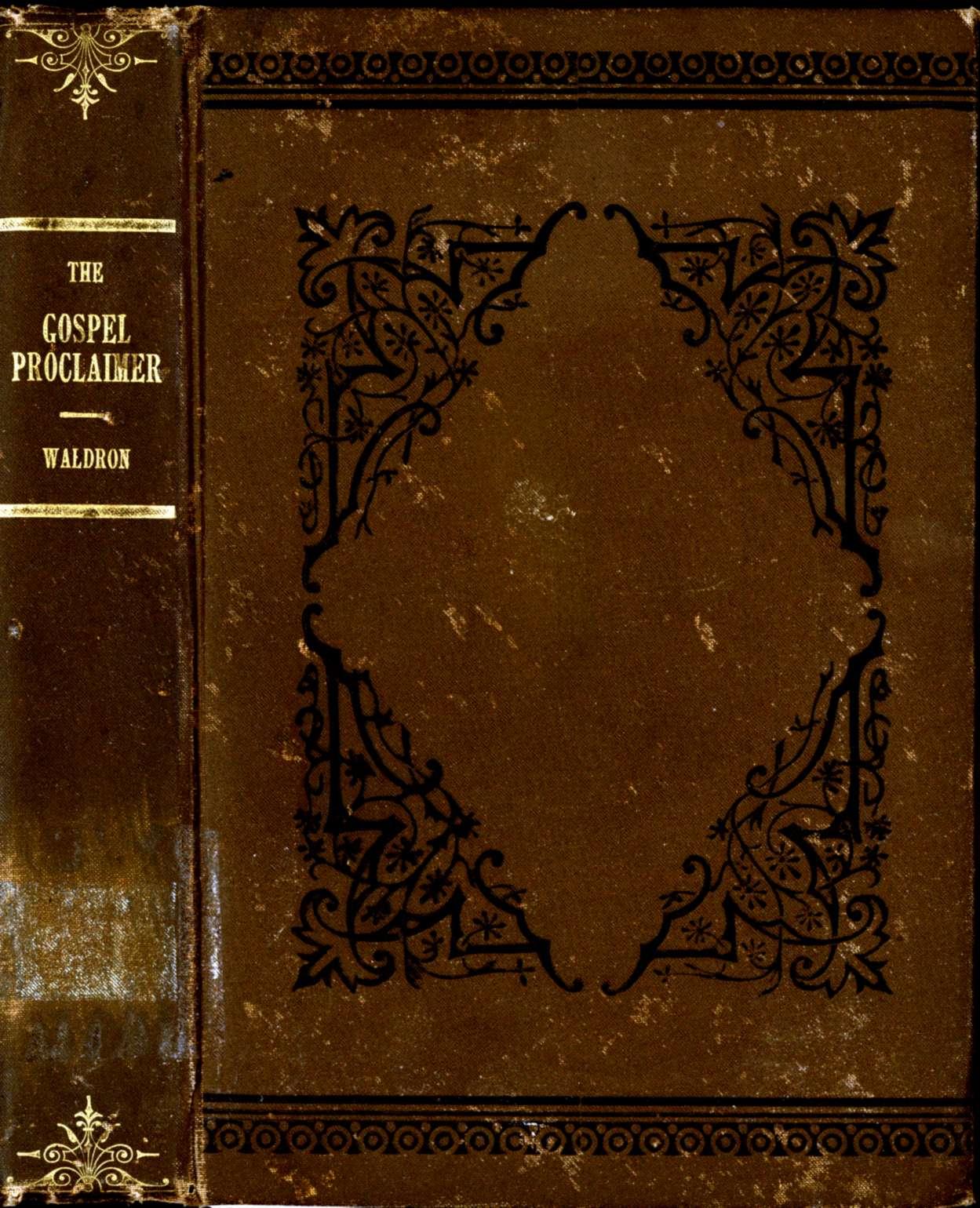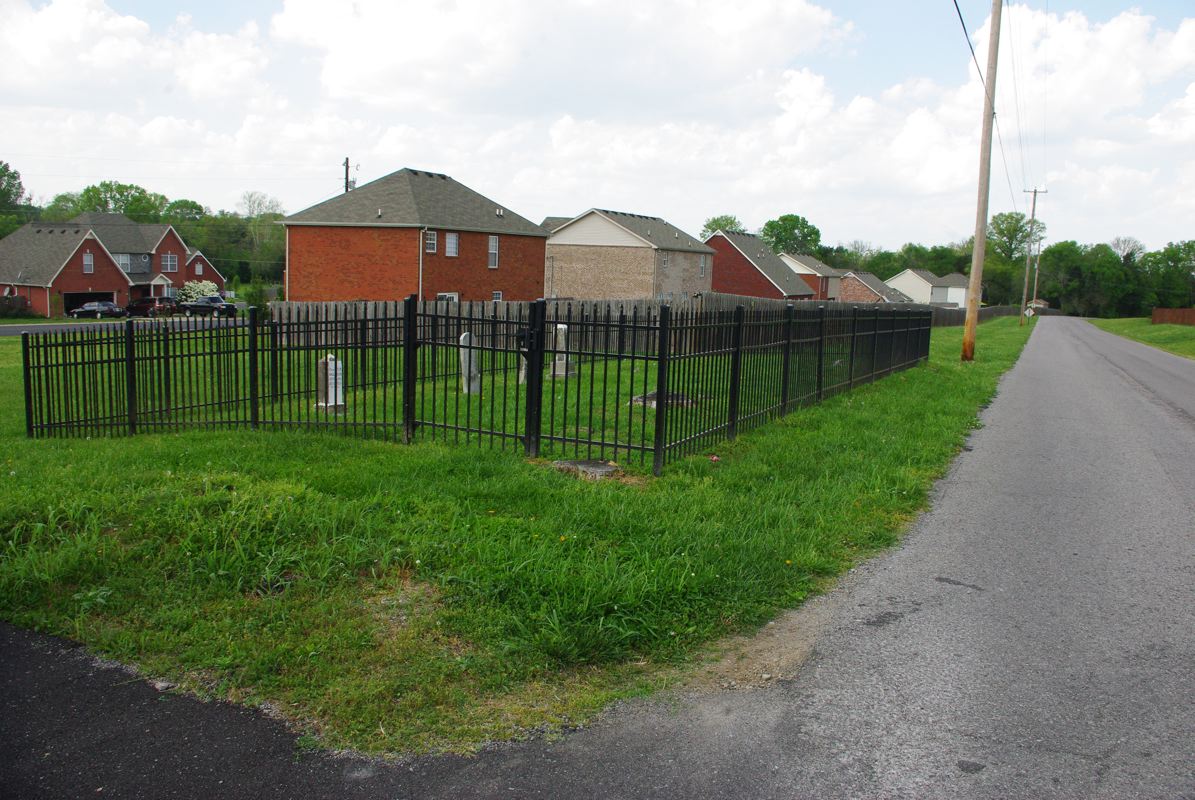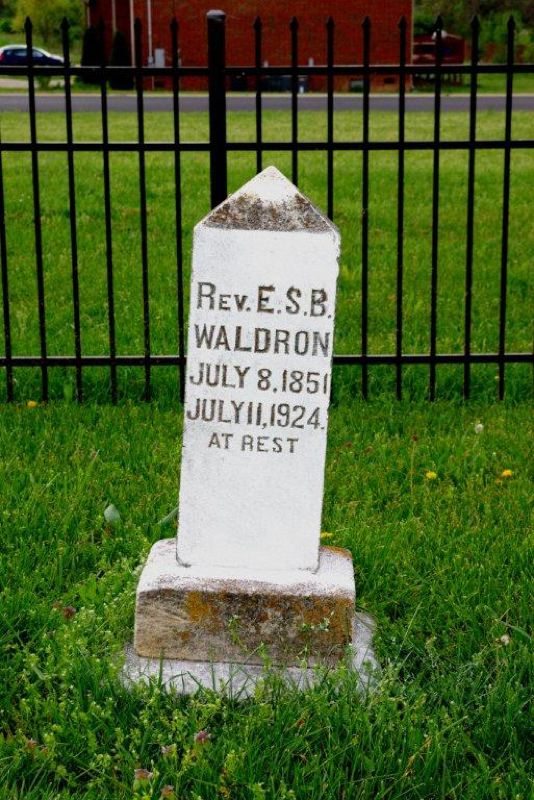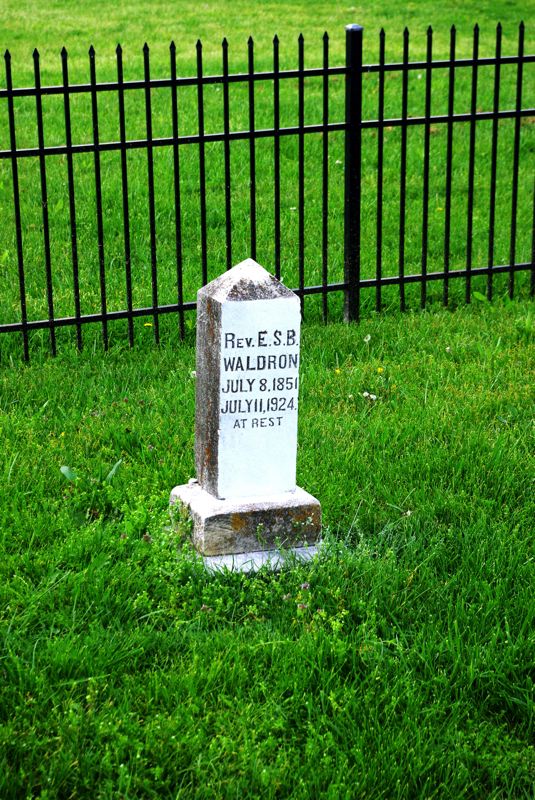E. S. B. Waldron
1851-1924
![]()
Introduction To The Gospel Proclaimer
 In presenting this book to the public, it is prudent to explain why it has been written. And, in order to do this, it will be necessary to give a brief history of my life, to place myself and motives fairly before the reader, that he may understand the design of the book.
In presenting this book to the public, it is prudent to explain why it has been written. And, in order to do this, it will be necessary to give a brief history of my life, to place myself and motives fairly before the reader, that he may understand the design of the book.
My grandfather Waldron moved from North Carolina, and settled in Middle Tennessee, about eighty years ago. He settled in the western portion of Rutherford County, near the Williamson County line. At that time a great portion of the country abounded in woods, cane, and other wild growths. Consequently he had a hard time clearing and cultivating, in order to make a living. Yet he succeeded fairly well.
After living where he first settled a few years, he bought a farm in Davidson County, near the southeast corner of that county, and moved upon it, upon which he lived until the time of his death.
He raised live boys and three girls, my father (whose name is William) being the oldest one of the boys. He taught all of his children to work, and sent them to school some. He accumulated enough to own three small farms, and a number of negroes at the time of his death, which took place a few years before the late war.
At the land sale my father bought the farm, which was situatedl in Rutherford County, and moved to it, upon which he has lived ever since. Consequently I was raised upon this farm, and labored on the farm until after I was twenty-one years of age.
My father raised a large family on this farm. He had too many children to school them all well, but sent them all to school some. I was just getting large enough to go to school when the late war broke out, which interfered considerably with my education. My oldest living brother, whose name was Robert, went out into the army, took sick, returned home, and died within a few weeks. This was the most gloomy time with us during the whole war. The country was tilled with soldiers, while my sick brother lay at the point of death. Finally he died, during the terrible fight at Murfreesboro. My younger brothers never went out into the war.
During the war I went to school a little, but everything was more or less in confusion. After the war closed I still went to school occasionally, as my father could well spare me and opportunities presented themselves. I obtained enough education to read very well in the Testament, and I attended preaching and Sunday school in the neighborhood when opportunities presented themselves. I noticed that preachers of different denominations preached differently, which somewhat confused me. I began to think, “Who is right?” Finally I, in company with one of my older brothers, went to Nashville, and went into a bookstore. I purchased a little Testament, paying forty cents for it. I concluded that I would read it through, to see what it contained. I had been to meeting a number of times, and heard preachers call up mourners; yet I did not know whether the apostles called them up or not. I knew that I had never seen anything of the kind in the Bible, what little I had read in it. Consequently, I concluded that I would read my little Testament through, to see if the apostles called them up. I began with the first chapter of Matthew, and continued to read as opportunities presented themselves, many times carrying my Testament in my pocket, and reading as I had leisure. Finally I read it through, without finding a single place where the apostles called them up. This somewhat confused me. I believed the Testament was right, yet I knew that some of my relatives, whom I believed to be Christians, belonged to a denomination that called them up. I studied over these matters and finally concluded that as I was young, and not an extra good reader, that I might have overlooked it. I concluded that I would turn back, and try it again. Consequently I turned back, and began at the first chapter of the Testament, and read with more care than before. I read it through carefully the second time without finding it. I then concluded that it was not right to go to a mourners' bench, for I could not find where the apostles called up mourners.
But while I was hunting for it I would have been glad to have found one example of that kind in the Bible; for I could not well persuade myself that my relatives, in whom I had so much confidence, would teach things that could not be found in the Bible. But after I had read my Testament through the second time I was thoroughly convinced that it was not there. I concluded that I could come nearer finding scripture that condemned its practice than favored it. Then it was a settled matter with me that I could not go to a mourners' bench.
During these times of investigation I would go occasionally and hear the disciples preach, and concluded I could find more of what they preached in my little Testament than I could of what the others preached. I believed the Bible to be right; consequently I believed that the people who followed its teaching the nearest were the nearest right.
Finally I heard that Isaac Sewell was to conduct a meeting at the Stewart's Creek Seminary. The meeting was to begin on Saturday at eleven o'clock. I attended and heard the discourse, paying good attention to the preaching, and when the invitation was given I walked up and presented my hand. I made the confession, and was baptized that evening, after which I attended this meeting the most of the time until it closed, paying good attention to the preaching. After it closed I attended prayer meeting on Lord's day as often as I well could, the distance being about seven miles. Finally, the brethren who lived near Rock Spring started a prayer meeting at that place, and, as it was much nearer for me, I met with them, and continued to meet with them during several years, assisting them what little I could in the meetings. Finally someone suggested that we should have a young men's prayer meeting, and, it being agreed upon, the appointment was made for one night during the week. I attended, and was soon put to work. My first public talk was made at one of these prayer meetings. After I made my first talk, at almost every meeting some one would call on me for a talk. I responded several times, and finally they would call on me to make a talk at the Lord's day meetings. I responded a number of times, and finally visited other congregations, making talks for them.
My first visit to another congregation was at Burnett's Chapel, in Davidson County. I was then nineteen years of age. I visited this congregation several times during the year, and the people turned out well. They seemed to be carried away with the idea of a boy preaching, and I really thought that I was a very good preacher.
The next congregation that I visited was Corinth, which was situated in the edge of Wilson County. I preached for this congregation several times, to large crowds. The people of the neighborhood turned out well.
Finally, I began to visit the Pleasant Hill congregation, and had good attendance there. I preached for this congregation monthly for a time, having a good hearing at each appointment. After some months, I concluded that I would go to school again. Consequently, I discontinued my monthly appointments. I started to school at Nolensville, a village situated in the eastern portion of Williamson County. Prof. J. G. Didiot, a Frenchman, was then teaching. When I first started I could scarcely understand him, but after going a while I could understand him better. At this school I studied Latin, in connection with my other studies. I read the Latin Testament partly through, and found that I could understand many passages in the Testament better by reading them in the Latin. This was both a help and a consolation to me.
My teacher liked me so well that he suggested that I attend to business for him, agreeing to pay me fifteen dollars per month for my work. This I accepted, as I was owing him some money for tuition. He wanted me to collect school accounts and attend to his vineyard. I went to work for him, collecting accounts, ordering wood hauled, and attending to business generally. At the proper time I went to work in his vineyard, and raised a good crop of grapes. I was compelled to hire help to gather, pack, and haul off, paying expenses as I went; and when I had sent off the last load, and had received returns which amounted to near three hundred dollars in all, I handed him the money, after paying the expenses of gathering and shipping. He then started to hand me money back, stating that the expenses of hauling off would have to be paid. I informed him that they were all paid. He then offered me his hand, saying, “I want to shake hands with you on that.” He appeared to appreciate the way in which I had managed his affairs.
He applied again for the school at Nolensville, but failed to get it. Consequently, he moved off about Christmas, before which time I had moved my little effects back to my father's. I farmed some, and preached as extensively as I could. I often worked hard on the farm through the week, and then on Lord's day morning rode quite a distance to fill an appointment. I soon saw that I would wear myself out at that kind of work. Consequently, I ceased to try to farm. I saw that it was impossible for a man to make a good hand on the farm, and at the same time make a good hand in the pulpit. During the year 1881 I planted and cultivated my last crop.
I continued to preach all the time, as best I could. The brethren paid me a little, but scarcely enough to meet expenses. Consequently, I concluded to teach school, I applied for the school near Travis' Mills, situated in Rutherford County, and succeeded in getting it. I taught four months, at thirty dollars per month, paying eight dollars per month board. Consequently, I saved up some money. After which I taught at several other places, and continued to preach as best I could. Finally, I was situated so that I thought it not best to be confined in the schoolroom. Hence, I abandoned school teaching, and continued to preach, selling books and doing other kinds of work, as I thought best. I traveled extensively over the country, generally on horseback, preaching the word of the Lord. Finally, I found a young man who owned a buggy, but no horse. Hence I proposed to buy it. The price being agreed upon, I took it, and found that I could travel in it with more ease to myself and horse than I could horseback. During the next six years I traveled almost altogether in this buggy.
Finally, I sent an appointment to preach at Cedar Hill, Hickman County. I began on Saturday night, and continued until I had preached sixteen discourses, which resulted in thirty-four being added to that congregation. This was the most powerful preaching effort of my life up to that time. On the second Lord's day of the meeting I preached on “The Authenticity of the Bible,” and after I had dismissed the congregation Brother James Lyell, who still lives near there, walked up to me and exclaimed, “You are the biggest gun that has ever shot here!” and I was real glad to see that the people generally enjoyed the meeting. There was one confession the last discourse that I preached. The meeting closed with a good impression, so far as I could see.
And I scarcely knew how tired I was until after it closed. I had preached and overheated myself and baptized, until I took a severe cold, which affected my throat; and I have, at times, ever since been troubled with my throat. Sometimes it worries me to speak at all. Sometimes I cannot emphasize my words as I would like to. But still I keep trying. I know that our Savior said, “Be thou faithful unto death, and I will give thee a crown of life.” (Rev. ii. 10.)
During these years that I have been preaching the gospel of Christ, I have enjoyed a good time at some places, while at others I have met with opposition and persecution. Several times malicious individuals have made up and told falsehoods on me, to injure my influence as a preacher. In the western portion of Williamson County, a few years ago, there was such a gross falsehood told on me that the people could easily trace it up and find it to be false. This they did; consequently it hurt me but little. In the hilly country, a few years ago, I was persecuted; but I am certain that the persecutor finally reaped the worst end of the disgrace. I am certain that it reflected back on the starter, like the kicking gun that misses the object fired at and kicks the shooter.
A few years ago, I conducted a meeting on Leatherwood Creek, in Hickman County, which resulted in some success. I worked up some interest. Some opposer (who I don't think lives there now) started a little persecution on me. As soon as I heard of it I was certain that it was told to destroy the good effects of the meeting. But, fortunately, I was over there after the meeting with a friend, who told those who inquired about it that he knew that these charges were false. Therefore, it showed that some one had started a falsehood. Such a falsehood generally does not hurt its victim long. When the people find out better it generally reflects back on the starter like the kicking gun that misses the object shot at, and kicks the shooter. Christ was persecuted, the apostles were persecuted, and I have been persecuted some, too. All true Christians may expect persecution. Paul says, “ All that will live godly in Christ Jesus shall suffer persecution.” (2 Tim. iii. 12.)
My object in referring to these matters is to show the young Christian who may read these pages the importance of bearing with persecution with becoming coolness. Christ told his disciples that they would be persecuted, and we may expect it, as long as there are wicked, worldly-minded people in the world. But during these times of traveling and preaching I have enjoyed myself much with brethren and sisters who were trying to be Christians. Many times they would seem so anxious to wait on me, and divide with me, that it would rather confuse me. Still, I appreciated their kindness. Life has both its bitter and its sweets. While I would enjoy myself one trip, perhaps the next I would not enjoy myself so well. I always endeavored to console myself with the thought that I was trying to advance the cause of my Savior. Many times have I went and preached when to do good was my only motive. Sometimes worldly-minded people would scoff at me for preaching at destitute points. Still I went, relying on the promise of the Savior for reward. I knew that he had said, “Every one that hath forsaken houses, or brethren, or sisters, or father, or mother, or wife, or children, or lands, for my name's sake, shall receive an hundredfold, and shall inherit everlasting life.” (Matt, xix. 29.)
While traveling and preaching I have seen many things and different portions of the country that I otherwise would never have seen; and I have seen many exhibitions of human nature that otherwise I would never have seen. I have seen some things that surprised me very much, and others that amused me no little. A few years ago I held a meeting at Graham Station, and worked up a good interest. Several were baptized. One evening, during the meeting a young lady was to be baptized. A number of people assembled at the creek; after singing and prayer I carried her into the water and baptized her. She came up out of the water shouting and slapping her hands all the time. And there was a little black dog in the crowd, which, upon hearing the woman hallooing and spanking her hands, thought it must run after something. It began to bark and look around to see what it must run after. Finally, seeing me trying to get her out of the water, it concluded that it would bite her. It made at her, while she was shouting and slapping her hands at every step. She paid no attention to the dog. I, seeing the dog make at her, kicked it off as best I could. Finally, it got around on the other side, and caught hold of her dress. By this time I had carried her out to the edge of the water, and some of the women on the sandbar gave the dog a heavy kick. It then went off and behaved itself. There were some negroes on the opposite side of the creek, who had come to see the baptizing, that caught the excitement; and one very large woman went up the hill shouting at every step. The young woman was so interested in her shouting, I don't suppose she knew the dog was trying to bite her.
During all these weary years of preaching, my throat would trouble me occasionally. Sometimes it would take a great effort on my part to be understood. Finally I concluded to publish some tracts and scatter among the people, and do all the good I could in that way. I published several different kinds, and sold and swapped until I scattered about twelve thousand among the people. It was quite a consolation to me to scatter these tracts, since I believed I was doing good for the cause of Christ. Sometimes I would meet with opposition; sometimes people would take them readily; sometimes people would criticize Waldron's tracts, not knowing that I was the man. While at Ashland City I showed them to a brother who did not know me; yet he exclaimed, “Waldron may be a good writer, but he is not much preacher.” Still he had never heard me preach. He had formed conclusions without knowing the facts. And while at Bridgeport, Ala., I showed them to a blacksmith. He began to pick over and hunt, and exclaimed, “I want one on baptism; I want something to whip out the Campbellites.” I handed him a tract on “ The Law of Induction Into the Kingdom of Christ,” and told him that it contained a sermon on baptism. He took it, and turned over to the sermon and began to read. He soon paused and looked confused. But, finally, I suppose to get out of the confusion, he bought twenty-five cents' worth of them. At other times people would express themselves freely to me, not knowing that I was the author of them.
I would always be glad when I could sell them, thinking that good would result from reading them. I traveled over a great portion of Middle, a portion of West, and a small portion of East Tennessee, preaching and selling my tracts. I made a great effort to sow the seed of the kingdom of Christ, and eternity alone can develop the good that was done. I can reach more people by preaching and scattering good tracts and books than I could by preaching alone. Several times I have heard of good that resulted from reading my tracts. Sometimes reading my tracts would cause the individual to search the scriptures, and would finally result in conversion. This inspires me to continue to try to scatter good reading matter. Therefore I have concluded that something bound in the form of a book, that could be read, laid away, handed around, and re-read, would be better.
Consequently I have written a number of sermons to be bound in the form of a book, that can be read, laid away in the library, and re-read. I have endeavored in these sermons to show up the plan of salvation so plainly that an honest inquirer after truth can understand his duty with reference to obedience to the gospel.
The “Gospel Proclaimer” is a work devoted to proclaiming the gospel to individuals, that they may be saved. The first part of it is devoted to the revelation of the plan of salvation; the second part of it is devoted to exhortations to the Christian. I have selected subjects that I thought to be of the most importance to the reader. Just under the heading of each sermon will show where it was preached, and how much was donated for preaching it. And I sincerely hope that this collection of sermons will do much good while I live, and I pray God to bless and prosper them after I am dead.
The subjects are handled in such a plain manner, certainly all who read them simply to understand them can be benefited thereby. My object has been to make the subjects handled plain, that the reader may be benefited. I have made no pretense to elegance of style, but my whole object has been to make the subjects so plain that the common reader may be benefited by reading them.
While my throat may fail, yet I sincerely hope that this book of sermons may be the means of benefiting, in a religious point of view, thousands of the human race, and that it may assist in keeping them in the narrow way that leads to the celestial city of God. May God bless and prosper every thought therein contained that is in accordance with his will.
-E. S. B. WALDRON. Lavergne, Tennessee., The Gospel Proclaimer, Introduction, pages 1-15. The book of sermons is out of print, yet a .pdf is available on this site for free. The Gospel Proclaimer.
![]()
Directions To The Grave of E. S. B. Waldron
E. S. B. Waldron is buried in just west of Smyrna, Tennessee, just off I-24 in LaVergne. Take Exit 64 off the interstate, and turn west. Turn to the second right, Carothers Rd. The road will bend around to the left. After the bend begin looking for a black metal fence around a very small cemetery. Waldron is buried in the enclosure.
GPS Location of the Grave
35°59'07.2"N 86°36'09.9"W
35.985320,-86.602761
![]()


Rev E. S. B. Waldron
July 8, 1851
July 11, 1924
At Rest
![]()
Photos Taken And Contributed by C. Wayne Kilpatrick 03.2012
Courtesy of Scott Harp
www.TheRestorationMovement.com
Special Thanks to C. Wayne Kilpatrick for making the information on this book available. He found the grave of E. S. B. Waldron in March, 2012. The book of sermons offered for free download has long been out of print. But the good effort of Bennie Johns has made this small book of sermons available for free download.
![]()
![]()


